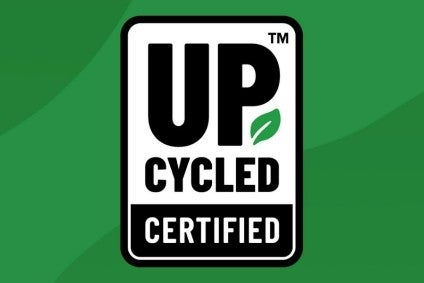
A product seal said to be the world’s first certification mark for upcycled foods has been launched in the US.
Local industry body the Upcycled Food Association (UFA) said the label would “provide consumers clear guidance about the presence of upcycled food ingredients” in a range of consumer-goods products, including food. “The mark gives consumers a crucial tool to address urgent climate and environmental crises through their purchasing power,” the UFA added.

Discover B2B Marketing That Performs
Combine business intelligence and editorial excellence to reach engaged professionals across 36 leading media platforms.
Alongside what the association calls the “core” mark, a second seal has been developed for use on products certified under a “Less Than PUI” designation. These products meet “all the requirements for certification with the exception of the percent upcycled ingredient or tonnage diverted thresholds”, the UFA explained.
“The ‘Less Than PUI’ designation was included … so all contributions to preventing food waste could be celebrated, establishing a reduced marketing allowance for Less Than PUIs to mitigate perceived greenwashing,” the association said. “The aim was to design the Less Than PUI mark to be clearly distinguishable from the core mark with distinctive design and language elements. After lengthy discussion which included input from UFA membership, it was decided the mark for the Less Than PUI designation will contain the words ‘Upcycled Certified Minimal Content’.”
Earlier this year, the UFA developed and launched what it says is the world’s first upcycled certification standard. Companies that wish to sign up for the certification must allow an audit of their supply chain to ensure their upcycled ingredients come from a verified source.
The standard also requires information on the amount of upcycled content within an ingredient or product, the amount of an ingredient that was set to be lost or wasted, and in most cases, demands they meet or exceed related thresholds. Other requirements include a demonstration of waste monitoring and information on greenhouse gas emissions.

US Tariffs are shifting - will you react or anticipate?
Don’t let policy changes catch you off guard. Stay proactive with real-time data and expert analysis.
By GlobalDataAn initial group of UFA members is taking part in a “beta” version of the certification programme. Products carrying the label showcasing the standard are to be unveiled by August.
According to the Food and Agriculture Organization of the United Nations (FAO), an estimated one-third of all produced worldwide is either lost or goes to waste.
One of the UN’s Sustainable Development Goals aims, by 2030, to “halve the per-capita global food waste at the retail and consumer level, and reduce food losses along production and supply chains including post-harvest losses”.
An area attracting increasing attention from the industry is the development of upcycled food brands, with a growing number of products hitting store shelves in multiple markets worldwide.
The country at the forefront of the still niche, but expanding, consumer market for upcycled foods is the US, where it’s estimated around 400 products are on sale.
just-food analysis: Moving on up – upcycling in the US





